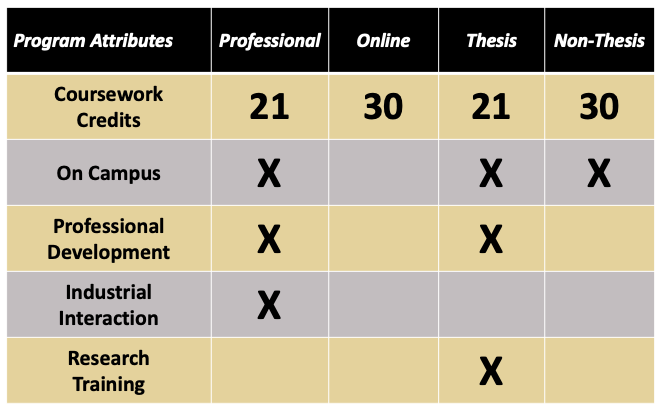Industrial Engineering Master's Degree Programs

Students from a broad array of academic backgrounds, seeking further development in chosen aspects of the design, analysis, and management of complex human-integrated systems are encouraged to apply. The School of Industrial Engineering offers multiple options for completing a Master's degree, to meet the various professional development needs of our diverse student body. The selection of an appropriate program is dependent on the educational goals of the student.
Professional Master's Program
This option offers students substantial coursework credits to develop a plan of study focused on their topic of interest, but includes an industry sponsored project and numerous professional development activities throughout the course of the program.
Online
This option offers students the ability to develop a plan of study that maximizes the credits dedicated to their topic of interest, for example, Human Factors. This option closely mirrors the structure of the traditional non-thesis Master's degree, but is fully-online to accommodate students who need the flexibility to be off-campus.
Thesis Master's
The thesis program provides an opportunity for independent research in a given area of Industrial Engineering. Pursuing the thesis option allows a student to extensively probe a topic of interest under the supervision of a faculty supervisor (research advisor). Generally, pursuing a thesis allows for the development of skills in independent research not available through coursework. The thesis option is generally only available for on-campus students. Students who intend to earn the doctoral degree must pursue this option.
Non-Thesis
This option offers students the ability to develop a plan of study that maximizes the credits dedicated to their topic of interest, for example, Human Factors.

Depending on academic background, the following coursework is recommended for all incoming students. Prospective students with a IE baccalaureate degree would naturally have completed equivalents to all of these courses during their undergraduate program.
- Mathematics through multivariate calculus, differential equations, and linear algebra (Purdue equivalents: MA 26500 and MA 26600);
- Applied probability and engineering statistics (Purdue equivalents: IE 23000 & (IE 33000 or STAT 51100); Alternately, students can include STAT 51600 and STAT 51700 in their plan of study and earn graduate credit for these courses);
- Proficiency in computer programming (Purdue equivalent: CS 15900)
- Note: Credits earned in basic prerequisite courses are not used in the plan of study for the master’s degree. Some graduate courses can be taken concurrently with the above prerequisites.
